Genre: Thriller. Goodreads meta-data: 3.84 / 5 by 4852 litizens.
Verdict: 5, a classic of its kind.
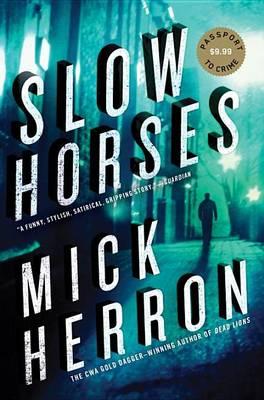
MI5 agent Cartwright fails a training exercise and is exiled to the outer darkness of Slough House, which like all that follows is not what it seems. It is neither in Slough nor is it a house. In this world nothing is as it seems. Nothing and no one.
Cartwright, a grandson of Callan who is an MI5 legend, and much of that organisation’s purpose now is terrorism of one kind of another, but when all the hedges are said and done, the Islamic kind. Though the office politics uses the dead language of McKinsey speak that is but a screen for a far more primitive and brutal kind of competition for status, turf, and career, which is waged more seriously than that against terrorism.
Spoiler alert. It is beyond me to describe the book without giving away the plot. Read no further if apt to read the book. STOP.
Cartwright finds there at the remote station in the outer darkness of London other MI5 rejects who are assigned meaningless work to keep them busy and to encourage them to resign from the Service. They number about a dozen under the sleepy gaze of Lamb upstairs. Unkept, unshaven, unwashed, untidy Lamb dozes the day away and drinks the night away. His supervision seems to be part of the punishment. This set-up does sound like the McKinsey seminar on managing-out the KPI failures, by sending them to the circles of Dante’s Hell otherwise known as training seminars and workshops until they crack. This method is necessary since it is no longer possible to dismiss someone for incompetence. Discrimination against the incompetent is verboten. Incompetence is a syndrome for which the society is responsible, not the individual, their barristers will argue. Amen.
The twist in the tale is that whitebread anti-terrorist vigilantes decide to up the ante by kidnapping a London schoolboy of Pakistani derivation and decapitate him on an internet feed. The three villains are as nasty and stupid as the target demographic of 7Mate. In hindsight there are several false notes. The kidnapping is too smooth for these bumblers to have managed. Moreover, the internet feed is technologically several miles above their ability with light switches. Still it gets things rolling.
In reaction there are wheels within wheels within wheels where some of the senior people in the Service use this event for career purposes, and worse. When things go wrong, as inevitably they must to make it a thriller, the best way to conceal those careerist manipulations is to blame the whole mess on the expendable denizens of Slough House. This turn of events rouses the sleeping lion that is Lamb to action and he motivates (most of) his crew to defend themselves from their own. This brief transformation occurs when he points out their likely fate if they wait for the blame bat to splatter them across the floor of a secret and illegal prison in Bulgaria which does not exist, officially.
‘Most’ not all, because three of the crew are only too ready to perjure and prostitute themselves to sell out Lamb and the others for the promise of a promotion. That corporate immorality certainly sounds plausible in any large organisation where backstabbing is the way ahead and scruples are not quantified among the KPIs. It is comforting to know that this is a general phenomenon.
Motivated by survival, the remainder of the crew takes action. Most of it is an internal conflict among factions in MI5 which has burgeoned with a budget swollen to match the anti-terrorism rhetoric of the age. And with a political class that does not want to know unpleasant things but wants them to go away. On the penchant for ‘smooth things’ see Isaiah 30:10.
Other characters include a rabid journalist whose extremism has gone even beyond the Fox News pale, if that is possible. That seemed another false note. There is no line of decency that Faux News will not cross, lemmings in tow. In turn, this journo has contacts in the respectable right of the Conservative Party in the person of an aspiring Leader who has verisimilitude.
It is a thriller and there is an axe, a ticking package, and a pistol, and the body count is three, but most of the decisive events occur in offices, albeit once after a beating, and the files do yield the ore of truth. Well, the body count comes to four, because by the sheerest of coincidences after the journo threatens the leadership aspirant he meets an untimely end a few days later on a zebra crossing. That problem went away.
The kidnap victim proves equal to the circumstance in unexpected ways that are yet plausible. Ditto the other characters.
That is the achievement of Herron to vivify a gallery of diverse and credible characters. The telling is that truncated and cross-cut style of the thriller that I dislike but in this instance it works, and I swallowed my objection as I turned the pages. At the start my aim to satisfy the recommendation of a friend, but soon I was reading under my own power.
It sounds like John Le Carré’s Cold War spy novels and it is. When the Cold War ended Le Carré tried other settings and the ones I read did not hit the mark for me. Without Smiley and Karla, well it all seemed like dog paddling in the shallow end.
Herron brings that grey world of spy and counterspy to the War on Terror with great panache and insight. Alec Leamas would fit in at Slough House. Indeed he might be the model for Lamb. However, reflection on the Cold War versions, not forgetting Len Deighton, brings to light a new element and that is the pathological dysfunction of the organisation. In Smiley’s world there were traitors like Bill Hayden, and hellbent careerists like Saul Enderby, too, but they were not yet ready to eat their own for new office furniture. They were many things but not the vampires, cannibals, and zombies that comprise MI5 in these pages.
The book offers a primer in the tradecraft of MI5, London Rules, joes, achievers, dogs, suits, black files, street walkers, grey books, and the like. I am sucker for that stuff and ate it with a spoon.
 Mick Herron
Mick Herron
‘The List’ is a novella that I read it about an hour and a half. It is cut from the same cloth as above, but the ambit is much smaller. My reading was slowed by guffaws and snorts at the characterisations and descriptions. Herron can turn a phrase, pin a butterfly to a board, nail a metaphor, all with the mordant wit of a bored viper.
In this brief tale, Five outsmarts itself in an exercise of double and triple duplicity. Lamb smells it but keeps silent for his own reasons, letting fools (who think they are so smart and so cynical) rush in. They do.
Category: Krimi
‘The Sweetness at the Bottom of the Pie’ (2010) by Alan Bradley
This is the first in a series of nine book-length titles (and one short story) recounting the many adventures of Flavia de Luce, aged eleven and a half, in Bishop’s Lacey of rural England of 1950-1951. ‘Flavia’ is pronounced, she has more than one occasion to say, to rhyme with bravia as in bravo.
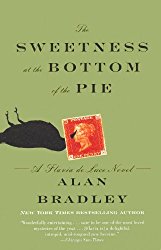
With pigtails flying, aside her faithful bicycle Gladys, Flavia goes where no plod ventures, under beds, into holes in the ground, inside ovens, over roof tops, through holes in the wall, diving in to muddy ponds, all the while musing on the wonders of chemistry.
It all began early one morning, very early, about 4 am, while she was waiting for an experiment to mature, Flavia discovers in the cucumber patch a dying man. ‘How interesting!’ is her reaction, as he breathes his last.
When plod, duly summoned, shows little interest in her or her observations (which are many) she resolves to get to the bottom of things before plod does. The race is on, but only one of the runners knows it: Flavia.
First stop, the local library, then the local gossips, as she mobilises village resources to identify the deceased and infer his purpose then to find his killer while plod follows police procedure, i.e., drinks tea, calls London, fills in forms, drinks tea, scratches ear, fills up tank of police car with petrol, rests, and goes home.
The cast of characters includes a largely silent Father, who occupies himself most hours behind closed doors with stamp albums. There is a bounded retainer, Dogger, whose emotional frailty is debilitating. Father and Dogger spent long years in Japanese prison camps, and in different ways have never recovered from it. Harriet, wife and mother, died just before the war, leaving a very large gap. Though gone for a decade she remains a presence in Buckshaw, the decaying family pile. At the mere mention of Harriet’s name, Father faints. Meanwhile, Dogger cowers in the greenhouse with his demons. Mrs Mullen does for them and provides a pipeline to the village and sanity.
Older sisters Ophelia, the narcissistic musician, and Daphne, the bespectacled reader, round out the ensemble cast. Rivalry among the three sisters has become Total Sibling War.
The Molochs of Inland Revenue undermine Buckshaw with questions, writs, and invoices. Harriet died without a will, leaving questions of property much vexed. Four years in a Japanese prison camp did not break Father, but Inland Revenue seems about to do so. He could satisfy these meat eaters by selling her jewels (valuable), books (rare), and automobile (handmade) but this he resolutely refuses to do, as if by keeping them he keeps her.
That Flavia is the very image of Harriet explains why Father can hardly look at her, though she does not understand this and feels slighted. Father and Harriet were cousin and he knew her at Flavia’s age.
I gulped down the nine books of the sequence, one-after-another, each a delight. Flavia does not always understand what she sees or hears or is said to her, and she makes mistakes. Nevertheless she has the optimism, audacity, energy, and determinism to overcome all obstacles, including those of her own making. When all else fails, when she is totally desperate, when there is no alternative, she will even tell the truth!
The plotting is neat, details play into the larger picture in due course. There are no superfluous asides and backstories. The characters are delightful, most of all the star of the show, Flavia, but also Dogger, Mrs Mullen, the Vicar, and the Weird Sisters, and more. While Flavia makes the snap judgements of youth, time and experience cause her to change her mind more than once. Call that growing up.
There is much chemistry. Like many a prepubescent girl, Flavia keeps scrap books. In her case they consist of newspaper and magazine cuttings of homicides by poisoning. She got kicked out of the Girl Guides when for a home science project she distilled arsenic from house cleaning products. On the wall of her room are autographed pictures of many chemists, particularly those whose work expanded knowledge of poisons. She has longterm plans for the Weird Sisters.
There are some false notes now and again, and the one book set in Canada at boarding school seemed somehow lesser, though it has some great moments, the whole is less than the sum of its parts.
Neither Amazon, Wikipedia, nor the author’s web page offers a simple chronological list of the titles in the series. Below is my effort to supply that list.
‘The Sweetness at the Bottom of the Pie’ (2009).
‘The Weed That Strings the Hangman’s Bag’ (2010).
‘A Red Herring Without Mustard’ (2011).
‘I Am Half-Sick of Shadows’ (2011).
‘Speaking from Among the Bones’ (2013).
‘The Dead in Their Vaulted Arches’ (2014).
‘The Curious Case of the Copper Corpse’ (2014) (a short story).
‘As Chimney Sweepers Come To Dust’ (2015).
‘Thrice the Brinded Cat Hath Mew’d’ (2016).
‘A Grave’s a Fine and Private Place’ (2018).
 Alan Bradley. Chapeux!
Alan Bradley. Chapeux!
I first espied one of these titles (‘As Chimney Sweepers Come To Dust’) in the English-Language section of a bookstore in Helsinki in 2016 and when I got back to it, I found it had predecessors so I started with the first, reading on the Kindle, and the banquet began. Now sad to say I have read them all, but fear not for I have returned to this, volume one, and started over. ‘As Chimney Sweepers Come To Dust,’ by the way, was the one I saw in Helsinki and I am glad that I did not start there as I might have then stopped, this being the one set in Canada as referred to above.
Dare we readers hope Flavia will continue her chemical ways in adolescence and adulthood?
‘The Portugal Sapphire’ (2013) by J. A. Jernay
Meta-data from GoodReads is 3.13/5 from 114 litizens.
Verdict: First in a series and last for me.
In these pages our heroine

– Learns conversational Portuguese in ten days
– Has hormone attacks at the appearance of any man with hair and teeth
– Starts with USD 2000 and all expenses paid and yet is broke on every page thereafter
– Trusts known criminals
– Is too naive to have made it to 29 years of age
– Flies from SFO to Lisbon in 3 hours
– Repeats the same dialogue far too often
– Cracks a long established Lisbon crime syndicate in one afternoon
– Out muscles experienced villains
– Whose legendary knowledge of gemmology is never revealed or relevant
– Who talks her way past alert criminals
– Leaves her handbag in the villains lair and has to go back for it
– Passes off an offsider as blind on a guided tour
– Does IKEA in each room
– Does Vogue with the dress of each woman and GQ for most men
– Almost none of the detail that plumps out the pages adds to plot or character
– Characters who are emphasised disappear like the police sergeant who did not collect
And so on.
Rom-krimi or Krimi-Rom is this genre bender. One in a series of many titles. First and last for me.
I came across it looking for novels set in Portugal before travelling there. No more for this reader. Though it is claimed to be a best seller in a heavily qualified attribution, among self published mysteries on Tuesday.
The prose is fluent and confident but absent either plot or character. There is some travelogue in Portugal but it is obscured by the features listed above.
‘The Sweetness at the Bottom of the Pie’ (2009) by Alan Bradley.
A krimi with energy, wit, chemistry, zest, and pigtails. It starts and ends with our heroine Flavia de Luce bound and gagged. As if that could stop this dynamo.
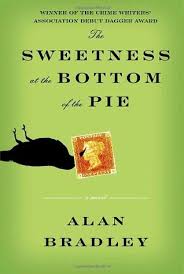
It is rural England of 1950. Flavia with her older sisters Ophelia and Daphne lives with Father in the crumbling estate of Buckshaw. Ophelia and her co-conspirator Daphne delight in tormenting Flavia who reciprocates with chemistry.
Unwisely stepping into this combat zone of sibling rivalry are a pair of villains who seek postage stamps. Yes, they want to send cards home to mum with Penny Blacks!
Father came back from the war a colonel with Dogger, the handy man, and both are largely silent. Dogger had been a POW on the Burma Railroad, and he goes blank now and again. The Colonel spent four years in Changi.
Father’s wife, mother of the girls, Harriet disappeared and then died. As the story opens Father spends most of his time with stamp albums.
Flavia does chemistry upstairs in a laboratory fitted out and left by a remote forbear. Daphne reads, often aloud, from the English classics lining the decrepit shelves, and Ophelia, the oldest at 17, preens constantly in the reflections of tea spoons, mirrors, water glasses, windows. She knows who is the fairest of them all and wants to know it constantly.
Then at 4 am one morning, while waiting for an experiment to percolate, Flavia comes across a dead man in the cucumber patch! Zounds! What to do? There are many house rules against ever intruding on Father and they would likely involve capital punishment at 4 am. Dogger, then. Yes, and for a man more of less comatose he proves very practiced at dealing with the dead. Flavia reflects on the fragments she has heard about him.
Plod arrives and dismisses the ‘little girl’ Flavia with a wave. Big mistake. That sets her off on her own mission. She tries to figure it out like a problem in chemistry: identify the interactions, resolve the components, assess the intensity, and so on. She interviews neighbours ever so subtly, researches in the county library, examines parish church tombstones, walks the woods for time and distances, talks to the old school tie, climbs on roofs, and more, all with the obsessiveness only a tweenager can muster. Meanwhile Dogger confesses to shield Father who confesses to shield Dogger, and Flavia, what else is a chemist to do to buy time for maturation, confesses to shield them both.
Then there is the itinerant architectural researcher tramping about. Is he really what he seems? Or did he come from Norway? Who ate the slice of cream pie? Why was the dead bird left on the back door step? Why is the county library closed just when essential information has to be found?
This title is the first in a series, and it is a delight. The erudition spills off the page with vitality. The learning is immense but the load is light as air. Flavia’s constant resort to chemistry provides the pole star. The plotting is meticulous and integrates everything. There is nothing superfluous. Every detail dovetails into the plot like Shaker furniture joined without a nail.
The denouement does drag on, but it works a delight when comes salvation in white. Loved the convoluted chain of reasoning that Flavia developed to arrive at Norway, matched to that of Plod who found it on a clothing tag.

Alan Bradley is a Canadian with many writing credits. There seem to be nine in this series to date.
‘Even the Dead’ (2017) by Benjamin Black
Dublin in the early 1950s is a world unto itself turned inward. Dr Quirke is a pathologist who observes much and suspects more. When a road accident victim’s corpse is examined he finds a contusion on the temple that is inconsistent with the car crash. Musing follows. In time, he mentions his doubts to the Inspector Hackett of the Serious Crimes Squad who noses around and finds unpleasant emanations. This is the seventh entry in a series and it is tired, but perhaps complacent is the right word: ‘If I write it, the reviewers will praise it.’ He did and they did.
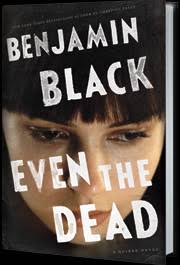
Though the spring weather is benign, the choking conformity of Maxima Catholic Dublin is inescapable. All in Dublin is more Catholic than the Pope. It is certainly more Catholic than the Rome of the time. The Bishop’s Palace is the seat of power in Dublin, not Tithe an Rialtais, the large Edwardian building enclosing a quadrangle on Merrion Street wherein dwells the Taoiseach by which we once walked.
There is only one escape permitted from this suffocating pall and that is alcohol. Frequently in Quirke stories, and no doubt in 1950s Dublin life, the pregnancy of unmarried women is paramount. Moreover, every thread, however long and ravelled, eventually traces back to the Catholic Church and its baleful tentacles.
These books are very well written and the picture of Irish life seen through Quirke’s eyes is to travel back in time. Yet in these books there is precious little detection, no police procedure despite Hackett’s occasional plod, and no mystery. Much is also predictable, as Quirke’s sexual conquests. As soon as a women is introduced into the story, we know she will soon succumb to his charms.
Instead we have Quirke, holder of a prestigious and authoritative position, a highly trained and accomplished medical doctor, a widower, father of a bright grown daughter, comfortable of income, handsome and attractive to women, who spends nearly every minute feeling sorry for himself in a self-imposed melancholia where he wallows for pages and pages, smoking cigarette after cigarette, drinking drink after drink. Evidently his pathologies did not involve lungs or livers.
Instead of detection we have meals, drinks, cigarettes, meals, drinks, cigarettes, meals….. On it goes. Yes, the prose is polished and the observations of life’s details exact, but repetitive and inert. There seems to be neither point nor purpose to the the prose. Some of the characterisations are profound, like Quirke’s terminally ill brother but have no place in the plot.

There is no doubt John Banville, Benjamin Black’s after ego, can write. The portrait of the victim’s father is striking and sympathetic. The contrast, however, is the government official whom Hackett interviews, who is little more than a cartoon character, flustered by the simplest question. Banville has respect for the father and none for government officials and it shows as he makes up the reader’s mind. Take that all those who work for the government, including those who uphold the intellectual property and copyright laws that secure Banville’s income. all those who regulate and maintain the internet services that provide a platform for his novels, all those who police crime and who had to deal with IRA on the border for a generation, all those who make difficult decisions about troop deployments on UN Peace Keeping missions, these are all clots!
I also found the reference to the Spanish Civil War confusing. The International Brigades were certainly there but the specifics mentioned in the story did not compute.
‘District VIII’ (2018) by Adam Lebor
Our hero is a homicide detective in Budapest, being of Romani extraction makes him both a curiosity and an asset. He is an asset because some major criminals are likewise Romani. Adolf Eichmann did not get them all.

Budapest is awash with Middle East refugees making their way west to Utopia. Reluctantly, the Hungarian government slows the migration to retain good relations with Western nations, while most people in the government try to profit from human trafficking. There are many wheels within wheels. So many I lost count and interest. Focus is not a word that applies in this book. Suffice it to say that everyone but our hero is corrupt to the core.
There is precious little detecting, and no police procedure to be found. Instead there is a thinly disguised critique of the corruption of Hungarian society and politics. It is laid on with a sledgehammer. The fittings and furnishings of every room are detailed. The attire of each actor spelled out. In this combination of Vogue and IKEA, motivation, character, and plot dissolve. Then their situation is traced back to the dire situation of Hungary trapped between Communism and Capitalism. The level of analysis is that of the ‘National Inquirer.’
There is some Gypsy lore and that was interesting to this reader, but it was not integrated into the plot for the simple reason that there was no plot. Just a pastiche of attacks on Hungarian society and politics. Everyone is either corrupt or incompetent. Fortunately some are both and that leads to their downfall.
In its eagerness to peach the book reminded me of the latter volumes of the Martin Beck series from Sweden. This series started out as low key police procedurals through which a reader learned much of Sweden but the books slowly became sermons on the evils of Swedish capitalism, as if the genocide of the 1930s Socialist eugenics program was somehow the good old days.
‘The Ashes of Berlin’ (2016) by Luke McCallin
A novel that exudes the grim time and place of the divided and contested ruin of 1948 Berlin.
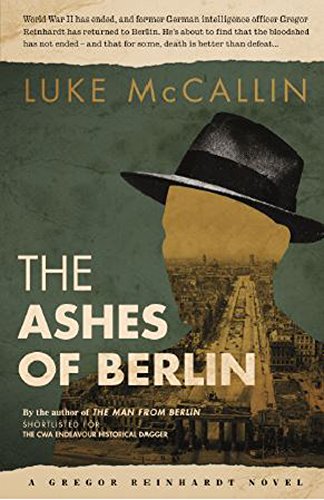
‘La Guerre est finie,’ as they say. Gregor Reinhardt is no longer a Wehrmacht investigator, but rather a police officer amid the divided rubble of Berlin, 1948. The police service is awash with returned German communist exiles inserted by the Soviets during the months immediately after Der Untergang before the Western Allies made it to Berlin. Like their Nazi predecessors, the Reds suppose crime is a product of the attributes of individuals. Whereas for Nazis it was race, for the Communists it is class. In neither case is investigation or evidence necessary. Nazi justice was to find the nearest üntermensch, beat them to death and the crime is solved. Communist justice is to find the nearest bourgeoisie and do likewise. Case closed.
In this Red Sea are some honest officers but they survive by keeping their heads down, and of course the opportunists who are always with us and they follow the Red wind as long as it blows.
Gregor is assigned to homicide which is housed in the American sector and that gives him a little leverage, thanks to a deftly inserted backstory. My usual irritation at backstories is because they do not develop either plot or character, but in this instance the backstory develops plot nicely.
When the murders occur, Gregor’s superiors obstruct the investigation as required by the krimi playbook. But, strangely the Soviets seem to want an investigation as Gregor learns through a back channel, but they do not wish to broadcast that. Strangely, the Americans are reluctant but have no wish to advertise this fact.
There are some well realised scenes when a Soviet officer talks to Gregor who also debates conditions with the American angel who got him out of a POW camp and into the Berlin police. Within each monolith are many fissures.
The victims killed in the same manner pile up and the link among them seems to have been service in a special command of the Luftwaffe. Thin ice ahead! Gregor has to tread lightly.
He does much back and forth through the rubble that is Berlin, and I followed some of it on an old online map. He meets disconsolate war widows, bitter Luftwaffe veterans, cynical street orphans, callous local police officers, an enthusiastic archivist from Paris, deals with the indomitable Frau Dommes in his office, marvels at the resilience of Frau Meissiner, his landlady, and many other characters, like the thug Fischer.
 Berlin, 1947
Berlin, 1947
That the trail was going to lead to some Nazi evil was a foregone conclusion. But that was moderated by the plot complication mentioned below, though it diluted the focus on the evil.
I particularly liked the time Gregor spent in the archives, using that mountain of paper to ruminate on the war and the place of individuals in it.
A couple of quibbles, first Nemesis is just too omniscient. He is a near übermensch. Moreover, Nemesis’s amalgamation of two groups of victims made no sense, but it was a means to complicate the plot.
Finally, could a unit of maximum Aryan Brandenburgeren really pass themselves off as Arabs? Really! I would have liked some coda with the unseen Lena. This is the second in the series I have read.
 Luke McCallin
Luke McCallin
‘Black Out’ (1996) by John Lawton
A police procedural set in London during the Little Blitz of early 1944 when V rockets rained down.
The murder of one and then two resident aliens, with a third suspected, is well out of the ordinary. Our hero becomes obsessed by it to the neglect of other duties but his superior, though vexed, is indulgent, and even supportive.
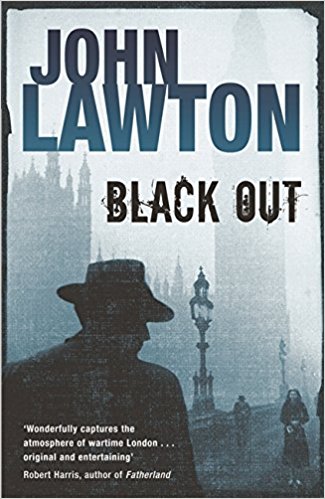
There is a large and intrusive US military establishment in London and it somehow seems involved In the mysterious deaths, so Plod noses around there, too.
There is much to’ing and fro’ing down mean nocturnal blacked out streets, many low lifes taking advantages of the circumstances, some patriots, and a lot of stoics hanging on.
I never did understand what the villain was doing and there is no wrap up at the end. What motivated him in targeting those three men remains unknown to this reader. Still less could I tell if his motivation was offical business, entrepreneurship, or just sadism.
Likewise I could not fathom his living doll who dutifully seduces Plod and then tries to kill him.
The author has more success with some of the supporting players like the wooden top who deals with the first murder, and the US army sergeant, though she is shallow, at least she has some vitality but her backstory was superfluous and she would not have worn battle dress in an office. I also like the brief role of an army guard who holds up Plod while Ike gets into a car.
That Plod is too dumb to realise the two women he has his way with are using him, is nicely done but in the end I am not sure that was intentional on the part of the author.
Plod’s own backstory which is parcelled out throughout the story is tedious and irrelevant, though it could have connected to that of the sergeant with some thought. Missed opportunity there.
The coda in Berlin was just too long a stretch. This reader was through long before that but kept reading hoping for enlightenment about the plot but none came.
 John Lawton
John Lawton
I liked the setting and set up enough to read another.
Four books, three good, one not.
‘The Nine-Tailed Fox’ (2017) and ‘Pong Pong Heart’ (2015) by Martin Limón
Entries in this reliable series following the (mis)adventures of George Sueño and Ernie Bascom, Criminal Investigators, 8th Army Headquarters, Seoul, South Korea circa 1972. In earlier reviews descriptions of the two protagonists and their world have been outlined elsewhere on this blog. Go there for background.
Suffice to say here, that these entries maintains the standard of the earlier titles.

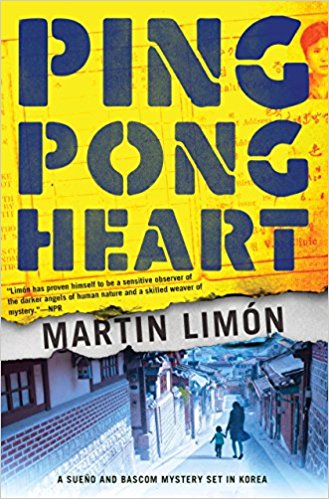
There are many things to like about these books. First is that there is always a mystery that requires detective work. Sounds simple but so many books in the genre lack both mystery and detection. The common substitutes are sex and violence.
In addition, here as in several others, Korean lore and myth are integral to the plot. That is, it is rooted in the time and place culturally, as well as materially.
Moreover, Limón treats the Koreans, be they business girls, file clerk Miss Kim, innkeepers, or the redoubtable Mr Kil of the National Police, with respect, even deference. It is, after all, their country.
There is much about how an elaborate organisation like the Eighth Army operates and a recurring cast of characters around headquarters, e.g,, Sergeant Riley who knows everyone and if asked very nicely can secure even top secret documents when official channels are closed, Lifer Harvey, called Strange for good reason, who knows where many bodies are buried, the blustering provost who has been counting off the days until retirement for a decade, the motor pool chief who sees a lot more than he tells, and so on.
There are also martinets, bullies, thugs, many of them field grade officers. There is a rich black market in PX goods and conflict among the army wives, too.
In short, there are many crossfires in which to get caught, and these two often do get caught. Conflicting orders are after all common in any organisation but never mentioned in KPIs.
George is moody and introspective, planning to stay in Korea when he hits twenty years and maximises the army pension. He is learning the language and tries to immerse himself in the culture in food, drink, music, arts, and so on. The ever resourceful Ernie always has his lock-pick with him, namely a size twelve boot with which he kicks in doors that for some reason will not open. Ernie plans to drink himself to death by retirement age.
Sometimes the bow is long but the arrow continues to fly true.
Anne Hillerman, ‘The Lion’s Song’ (2017)
Inheriting the mantle from père Tony must have been difficult in every way. Yet I have read to the end each of her three novels and found things in them to like. I do not bother to finish books that do not engage my interest. Best to stop beating one’s head as soon as possible.

Chee, Bernie, and Leaphorn each play a part in this one. But always the dominant character is the place, in this instance the Grand Canyon. To see it is to know why it is called that.
A proposal for a tourist development near the south rim of the Grand Canyon is on the table. There is a great deal of money at stake, and some of it is already wafting around. There are so many overlapping, competing, and conflicting jurisdictions that no one is quite sure who has the last word. In addition there is the St Bartholomew parade of activists, interest groups, holier than thou greenies, each and all of whom want a say, not just a say, but THE say. Then there are the native Indians, who are divided among themselves, first by tribes, but also by generation, and by more venal interests, too.
The stew is rich and to sort through it a mediator is employed, a very seasoned lawyer from Phoenix, who has done this kind of thing before. He works methodically and with superhuman patience.
Is it just coincidence that his car was blown up? Why do the lights in the town hall where the host is gathered keep going out? Why does the mediator seem to disappear at times?
In a game of hot potato Chee is assigned as the mediator’s bodyguard and he comes to learn a great deal about his backstory and that might explain current events.
The variety of characters is good and they are given individuality. The complexities of the mediation are well realised. The elderly grandmother is arresting. The fog in the Grand Canyon during which the title is explained is marvellous.
Yet the balancing act with three foci — Bernie, Jim, and Joe — is just too much. Also there are far too many pointless descriptions of the pockets from which keys are extracted, the winding down of car windows, the aroma of tea, and so on and on and on. Some readers, perhaps this very reader, were shouting at the book to move on. This a lot of this padding.
Cowboy Dashee appears in this one and I thought he met his end a long time ago in another book. I mean him no ill will but I was surprised to read of him. I think it was ‘Dark Wind’ (2010) and I will check on that for my own satisfaction.
John D MacDonald. ‘The Deep Blue Good-bye’ (1964)
Graeme Blundell recently recommended JD. Long ago I tried to read one, this one I think, and put it aside. I have done so again.
This is the first in a very long running and successful series — twenty-one titles according to Wikipedia — and perhaps some things changed with confidence and success, and perhaps they change for the better but I will never know. This is the one Blundell, whom I find a reliable cicerone, recommended so I tried it.

Outer Florida in the 1970s was a frontier where a loner could go to escape and that is what Travis McGee does on his cruiser in the Keys. MacDonald does the regional accents and the class syntax well, but it just goes on, and on and on and on. The characters are differentiated. The locale is brought to life. All that is true.
But it proceeds by endless exposition, like a textbook. There are pages and pages of exposition. Page and page. It is exhausting without forward progress, like listening to a non-stop motor-mouth. One does nothing but grows tired.
I gave up at the twenty percent mark according to the Kindle. If I have not suspended disbelief by that time with a book and entered into its world, I do not press on. There is no honour in the hollow achievement of finishing something I would rather not have started.
A screenwriter would be needed to pull it apart and give it some life. Even the scenes where Travis is questioning witnesses read like depositions rather than dialogue.
John D MacDonald has an interesting backstory himself, but knowing it does not make the book any more engaging. He was a Harvard MBA who gave up a corporate career for the typewriter when he had a young family and worked hard at being writer. I admire that, but, well, see above.
‘The Silent Second’ (2017) by Adam Phillips
Chuck Restic is a human relations manager in a large firm in La La Land. HIs career peaked years ago and while his star descends that of his wife, a property lawyer, ascends and they part company without acrimony.

Now Chuck has time on his hands and the hum-dum of the office offers little distraction. In response to a complaint from a employee he talks to Ed about his cologne. Yes, about his cologne. An explanation is below. Chuck finds Ed a nice fellow.
A few weeks later quite by accident Chuck learns that Ed disappeared shortly after that interview. Time passes and Ed does not return. After four weeks AWOL the corporate policy is to clear Ed’s cubicle, box the contents, and mail it collect to the listed address. He is sent down the Corporate Memory Hole.
Chuck decides to pass some time by taking the box to the address by hand. In so doing he is gradually drawn into a real estate swindle in which Ed himself was somehow involved. But when Ed’s body is found, it gets worse.
There are some very tough guys around who fancy themselves to be the Armenian Mafia, Lincoln Heights Branch. They may be tough but the smart money is played by a zillionaire who is pulling all the strings.
Along the way, Chuck finds solace with a police officer who throws herself at him, a fact he accepts as his lot. Too bad he had not seen ‘Funeral in Berlin’ (1966) where Harry Palmer realises immediately that Eva Renzi is up to no good when she throws herself at him. Poor Chuck.
Chuck is bored at work and idle at home so he starts nosing around and gets in deeper and deeper. Then one of his buddies is murdered and the plot gets thicker quicker. While I remembered Harry Palmer’s self-deprecating cynicism and saw the punch coming, it is played out very well.
There are technical details about Lost Angeles real estate that provide much of the mystery, and while the Armenians are much in evidence, they know there are bigger fish in this sea. Chuck doesn’t and keeps stumbling around.
But after a thirty year career of insufferable Power Point presentations, unending off-site retreats, excruciating 360 degree reviews, maniacal KPIs, and nightmarish McKinsey-speak, being beaten up by Armenians comes as something of a relief to Chuck. Still all those years in HR gives him access to a lot of personal information about personnel past and present and even applicants that he puts to use. Futhermore, it has taught him how to read between the lines in files to find out more. He also has contacts among freelance journalists who in the past have dug out information for him; in short, there is a solid base for his investigations.
As to the cologne, this is the story. An employee lodged a formal complaint against Ed for wearing so much cologne that she became ill. Mind, Ed did not work near her cell, er cubicle, but only walked by it once or twice a day. Still she filed the paperwork, and once filed it fell to Chuck to deal with it. It all seemed so realistic.
The complaint was vexatious. The complainer had been with the firm less than two years, during which time seven formal complaints about comparable matters had been filed, while the complained did little productive work. But the complainer, once hired, was untouchable, being a forty plus, pregnant, black woman who ticked all the demographic boxes for a huge personal injury suit from giant uncaring oppressive corporation that had made mistaken of hiring her. She had to be placated at all costs. Ed, on the other hand, had been with the firm for more than a decade, was extremely productive, corporate loyal, but as a white, middle-aged man he would never win a lawsuit. Such is the corporate logic in these pages.
 Adam Phillips
Adam Phillips
While the plot is straight out of Raymond Chandler with updates and located in the world of real estate, the corporate backdrop strikes a cord with this reader. The author produces an interesting variety of characters and gives each a distinctive voice. There is much travelogue of the Lost Angeles where people live and work well away from the Tinsel Town stereotypes. The corporate world and the real estate context are refreshing. This is the first of a series and I look forward to reading another.
